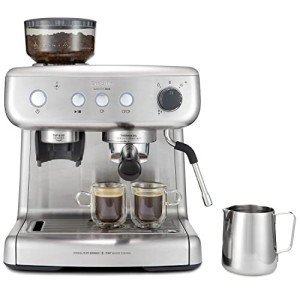Everything You Need To Learn About Energy-Efficient Espresso Machines
Energy-Efficient Espresso Machines: A Comprehensive Guide
In the world of coffee enthusiasts, espresso machines are typically considered necessary devices for brewing abundant, aromatic coffee. However, the energy consumption connected with these machines can cause increased energy expenses and environmental concerns. As customers become more eco-conscious, energy-efficient espresso machines have actually emerged as a popular option. This post aims to explore the functions, advantages, and choices available in energy-efficient espresso machines, assisting coffee fans make informed choices.
What Makes an Espresso Machine Energy-Efficient?
Energy-efficient espresso machines are designed to reduce energy usage while maintaining ideal performance. A number of functions contribute to the energy performance of these machines:
Insulation: High-quality insulation assists keep heat, lowering the energy required to maintain ideal developing temperatures.
Smart Technology: Many modern machines are geared up with programmable settings that permit users to set up brewing times and change to standby mode when not in use.
Quick Heat-up Time: Energy-efficient espresso machines frequently use advanced heating technologies, such as thermoblocks or PID controllers, to heat water quickly.
Low Wattage: Machines that run at lower wattages consume less energy in general, making them more effective.
Car Shut-off: Automatic shut-off features guarantee that the machine turns off after a particular duration of lack of exercise, more reducing energy waste.
Advantages of Energy-Efficient Espresso Machines
Buying an energy-efficient espresso machine can provide numerous advantages:
Cost Savings: Over time, lower energy usage can result in minimized electricity bills.
Ecological Impact: Using less energy decreases carbon footprints, making these machines a more sustainable choice for ecologically mindful consumers.
Improved Performance: Many energy-efficient designs likewise provide exceptional brewing innovations, resulting in better-tasting espresso.
Resilience: Typically, energy-efficient machines are built with high-quality parts, resulting in greater longevity.
Features to Consider
When choosing an energy-efficient espresso machine, several functions need to be considered:
- Type of Machine: Options consist of manual, semi-automatic, and fully automatic designs, each with differing degrees of user control and automation.
- Brew Quality: Look for machines that make use of high-quality brewing systems to guarantee ideal taste extraction.
- Maintenance: Some machines have self-cleaning functions that can conserve energy and effort in upkeep.
- Capability: Depending on individual or household size, machine capability can impact energy consumption, with larger machines typically requiring more power.
Popular Energy-Efficient Espresso Machines
The market provides a variety of energy-efficient espresso machines dealing with different needs and choices. Below are some noteworthy designs:
Brand
Model
Key Features
Energy Consumption
Breville
Barista Express
Integrated grinder, PID temperature level control, quick heat-up.
Low
DeLonghi
EC155
Compact size, easy to use, long lasting construct.
Moderate
Rancilio
Silvia
Heavy-duty style, excellent temperature level stability, and has a low ecological effect.
Moderate
Gaggia
Classic
Trustworthy manual operation, long lasting brass parts, and effective steaming capability.
Low
Jura
E8
Completely automatic, clever features, and a detachable brew group for simple cleaning.
Low
Tips for Optimal Energy Efficiency
Aside from selecting an energy-efficient model, consumers can embrace several practices to make the most of energy effectiveness:
- Preheat: If your machine has a pre-heating function, use it to make sure that the optimal temperature is reached quickly before brewing.
- Switch off After Use: Always switch off the machine after developing or use machines with car shut-off features.
- Routine Maintenance: Keep the machine properly maintained to guarantee it operates effectively and efficiently.
FAQs About Energy-Efficient Espresso Machines
1. Are energy-efficient espresso machines more costly?
While the initial investment might be greater for energy-efficient designs, the long-term savings on electricity expenses can offset the initial expense. In addition, many energy-efficient machines included advanced functions that boost the developing experience.
2. How do I understand if an espresso machine is energy-efficient?
Look for indicators such as Energy Star certification, user reviews, and specs relating to wattage and heat-up time. Machines with specific functions focused on reducing energy consumption are normally designed for much better performance.
3. Can I use an energy-efficient espresso machine for other coffee styles?
Lots of energy-efficient espresso machines use versatility, enabling users to brew different coffee designs beyond espresso, such as lattes and coffees, by incorporating steaming capabilities.
4. Do energy-efficient designs compromise quality for effectiveness?
Not necessarily. Lots of energy-efficient espresso machines are geared up with high-quality brewing technology that can enhance taste extraction while lowering energy consumption.
5. What upkeep is required for energy-efficient espresso machines?
Regular maintenance includes cleaning the machine, descaling when needed, and periodically examining seals and gaskets to make sure optimum performance and energy performance.
Energy-efficient espresso machines represent a best blend of performance, savings, and ecological responsibility. By considering different features, benefits, and brand names, consumers can select a design that matches their distinct choices while contributing favorably to the environment. As Coffeee towards sustainable living grows, the popularity of energy-efficient appliances, consisting of espresso machines, is most likely to continue its upward trajectory, offering coffee lovers a guilt-free method to enjoy their everyday dose of espresso.
